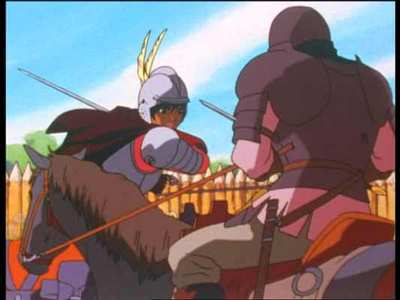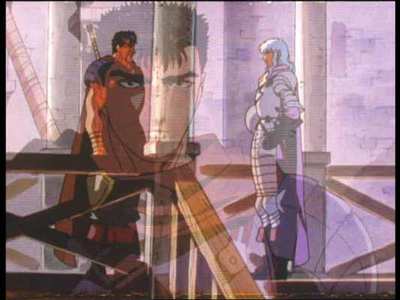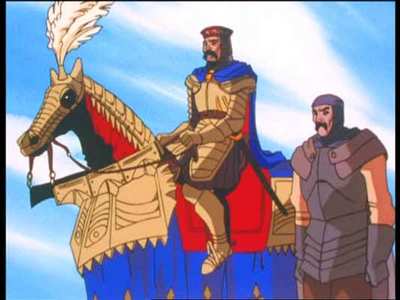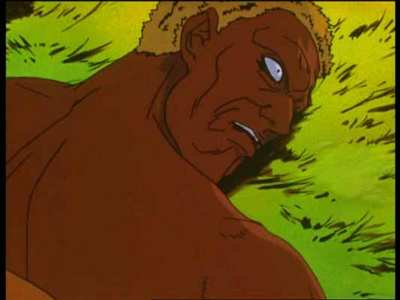Review of Berserk: Volume 1
Introduction
In the UK, anime is very much a now thing. There are the odd exceptions, classic films like Akira and Ghost In The Shell, shows like Evangelion, as well as the Ghibli catalogue, which will always find a place on the store shelves. But otherwise, the industry pays attention to what is popular and current, and once it is released it fades from the memory into the aisles and boxsets of the online retailers. Actually, it`s more like one of those plus one channels. US distributors keep an eye on what is popular in Japan, or rather what will be popular among Western audiences, and are quick to licence promising titles. Then, it will take six to eighteen months after they complete their Japanese run to be translated, dubbed, subtitled and reedited (English language credit sequences) before being released in the US. Then we in the UK will finally get to see (a choice selection of US titles) a year after that. So for us in the UK, anime is a now + 2 years thing. It is therefore striking to find an anime being released which is ten years old. Berserk, now being released by MVM was made in 1997, and it begs the question what took it so long? It`s either budget cuts at MVM, or that Berserk is very, very good. Could it be one of those rare timeless anime classics?
The European mediaeval period has been the setting for countless films and shows, but I have trouble recalling whether I have seen it done in anime before. If uniqueness is a selling point then Berserk gets off to a good start in that respect. Set in the fictional nation of Midland, it follows the story of a young mercenary named Guts, who wields an unfeasibly large sword, one that would have Cloud Strife of Final Fantasy green with envy. After proving his prowess on the battlefield, he is recruited by a powerful mercenary lord named Griffith into his Band Of The Hawk, in the ongoing war between Midland and the neighbouring Chuder Empire. But it`s an ill-omened decision as we learn in the first episode of the series.
This first disc contains five episodes.
1. The Black Swordsman
Midland is a forlorn place, downtrodden, miserable; all since King Griffith ascended the throne, although no one is so bold as to say it out loud. The nature of the new sovereign becomes apparent, when some of his castle guard drag a girl into an inn for a little fun. No one dares lift a finger to help her, no one that is except the Black Swordsman, who uses the guardsmen as a bloody message for Griffith. The Black Swordsman is a grizzled veteran, wearing the scars of his experiences and literally haunted by the past because of a mysterious brand on his skin. He has vengeance on his mind, but there are supernatural forces arrayed against him. The local fief lord has been expecting the Black Swordsman, and he slaughters the townsfolk and torches the town just to make a point to his foe. But when the Black Swordsman confronts him, he finds he`s facing a demonic monster, not a man.
2. The Band Of The Hawk
Which is where the flashback sequence begins, an earlier time, when the Black Swordsman was a young and hale mercenary named Guts. When Guts takes part in a siege on a castle, it`s only his skill and his monstrous sword that can defeat the powerful Grey Knight. It`s a battle that catches the eye of Griffith, one of the castle`s defenders. Later, Griffith`s band decide that Guts would prove to be a choice target for a bit of robbery, much to their eventual regret. It takes Griffith to put the young man down, only his consummate skill with the sword outclassing the young man`s power. But rather than kill him, Griffith offers him a job.
3. First Battle
Guts is now one of the Hawks, much to the ire of Corkus, would be thief who started the whole mess by challenging him. Guts may be a reluctant recruit, but he`s already picked up a curious champion in Caska, a young warrior woman who turns away an assassination attempt. She`s been close to Griffith for years, and she is now surprised to see how Griffith is treating Guts, almost as an equal. This trust is established in their first battle, where Guts gets the important position of rearguard on a raid, charged with keeping a counterattack at bay. It`s a test, one that is oddly pre-empted when Griffith decides that Guts needs rescuing.
4. The Hand Of God
The Hawks aren`t the average band of mercenaries, Corkus aside, and Guts is surprised to see the level of loyalty that Griffith engenders. Griffith confides his ambition to him when he shows him a Behelit, an oddly alive pendant given to him by a fortuneteller. Whoever possesses the Behelit is destined to rule the world, and Griffith intends that he will be that man, ending the aristocracies and rule of blood.
5. A Wind Of Swords
Three years later, and the Band of the Hawk are Midland`s avenging angels, their reputation striking fear into the hearts of their enemies. Guts has risen to Captain of his own company, while Griffith has been honoured by the king himself, receiving a knighthood, and royal recognition for all his men. That also means that they are the go to guys when it comes to difficult missions. Caska continues to accuse Guts of impetuousness, but it will be down to Guts to save the day, when a raid on an enemy outpost turns out to be a trap.

Video
Berserk gets a 4:3 transfer that takes us back in time to when CGI was an expensive tool for only the biggest budget productions, when people still animated with paints, pen and ink on little pieces of acetate. Even when compared with its contemporaries like Trigun, Berserk seems to fade into the background, with a dull and understated feel, an uninspiring palette of colours, and animation that only ever does enough, and nothing more. Having said that, there is a consistency and level of detail that never makes you feel as if you are watching something cheap and rushed.
The transfer itself is pretty creaky. There is a slight degree of print damage and grain, but never enough to really stand out. More obvious are videotape artefacts, in the form of white streaks across the screen. Fortunately, they are confined to the very bottom of the image; indeed you may not see them at all depending on your screen.

Audio
You have a simple choice between DD 2.0 English and Japanese, with optional translated English subtitles. I opted for the Japanese as always, and found the audio to be suitable. There isn`t a great degree of separation, but the dialogue is clear. I wasn`t too impressed with the theme tunes, but the incidental music is excellent, suiting the action and the quieter moments well. It`s no surprise when you see Susumu Hirasawa`s name in the credits, the composer who would later go on to collaborate with Satoshi Kon on his films as well as the Paranoia Agent series.
I had forgotten what older dubs sounded like. I always opt for the original language track, and while I can nitpick modern dubs, they are a world away from what dubs used to be like ten or so years ago. Berserk`s dub sounds as if it overlays the action, instead of being part of it. It`s of the type where voices are chosen for the look of the character, so Guts is a badass with a hint of good guy smooth, Griffith is ever so slightly effeminate, to go with his long blue hair, Caska is the textbook definition of butch female, she could have come from a James Cameron film, while Corkus sounds sneaky and brash. And none of it is really all that good.

Features
The extra features offer little more than the average anime disc; beginning of course with the obligatory animated menus and jacket picture. You`ll also find 36 line-images in a Production Sketches gallery, 8 images in an Art Gallery, 2 minutes of English voice actor screw ups in Outtakes, the Textless Opening, and the Berserk trailer.

Conclusion
We have a ten-year-old anime that looks as if it belongs in the mid-eighties, the English dub is nothing to write home about, the transfer could have been better, and the anime follows the golden rule of stupid names for characters, Guts! I ask you. The real shock is that Berserk is good, damned good. There is the mediaeval setting, the hint of the supernatural, the hint of sex, the action, and plenty of blood and… well viscera (stupid, stupid name!), all of which would appeal to the grassroots anime fan, especially in the UK. But Berserk turns out to be much more than the sum of its parts, with what is turning out to be an excellent story.
My first reaction to watching this was Gungrave, and if it turns out that the two stories are similar in structure and tone, that can hardly be a bad thing. Like the later Gungrave, the story is told in flashback. We begin with a Black Swordsman looking for revenge against a hated King Griffith. The Black Swordsman is scarred, haunted, and missing vital bits of his anatomy, which make him an all the more deadly killing machine. It also turns out that the world in which he travels is skewed from normality, especially when he has to face a giant snake monster in battle. It all enough to make you wonder how such a dread state of affairs came about, which is when we go into the flashback sequence to a much happier time.
Back when the nation was at war, and when Guts was a young mercenary barely out of childhood, his relentless aggression on the battlefield and utter ruthlessness caught the eye of a leader of mercenaries, Griffith. While Griffith is loved and respected by his soldiers, he remains aloof and aside from them, but in Guts he sees an equal, proved when a duel takes both of them to their limits. Guts` arrival in the band is treated with suspicion by some, hatred by others, but he has something of a charmed life, and gains acceptance by the others with his prowess in battle. Griffith begins to confide his ambitions to Guts, and when we catch up with the band three years later, we see that Guts, while still impetuous and headstrong, has developed a fierce loyalty to Griffith.
We`re just getting to know the characters as yet, but already several stand out. We learn why Guts is the way he is, with another flashback sequence that shows him to be an ill-omened orphan, one whose sole father figure turns on him after being crippled in battle. It explains why he is a loner and so reluctant to trust. Griffith at this point seems amiable enough although with a hidden streak of ruthlessness. He obviously believes that he is a man of destiny, one who believes that only an equal can be a friend. It explains why he takes Guts as a confidante, almost against his will, a decision that sparks a fair amount of confusion and some bitterness among his men. Corkus in particular never accepts Guts, and it is surprising that he is still breathing after three years, conspiring against him on more than one occasion. Caska is the most interesting. She`s a warrior woman who is close to Griffith, one of his Captains, and her feelings are conflicted when Guts joins the group. While Griffith obviously respects and trusts her, even has some affection, her own loyalty seems to go deeper than just that of a soldier to her leader. On the other hand her fiery relationship with Guts threatens to evolve into something closer. If such should happen, it would be interesting to see how Griffith reacts.
In the background, the war and politics between two nations carries on. By sheer dint of success, the Band of the Hawk becomes more and more indispensable to the kingdom of Midland. The aristocracy and nobles see the elevation of a mere mercenary band as untenable, and there appear to be moves against them from within. At the same time the Chuder Empire see the Band of the Hawk as the enemy to eliminate. As the disc concludes we see the mercenaries facing what looks like an un-winnable siege, placed directly into harm`s way by the king himself.
Don`t let the age and the animation put you off. This first volume of Berserk heralds what looks like a gripping story. Its intelligent, thoughtful narrative proves to be an instant hook, and the mediaeval European setting, despite the odd anachronism is well accomplished and different enough to give Berserk a quite unique feel. Recommended.
Your Opinions and Comments
Be the first to post a comment!